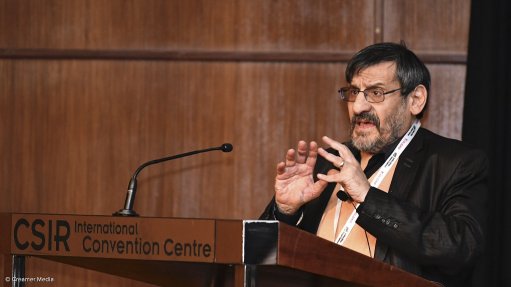
UJ Professor Steven Friedman
Photo by: Creamer Media's Dylan Slater
University of Johannesburg Professor Steven Friedman has called for an “urgent conversation” between people with technical expertise who understand planning and transport issues, to debate ways in which the country can begin to integrate its poor people into the country’s economic hubs.
This conversation, he explained at the Southern African Transport Conference (SATC), on Monday, could eventually lead to negotiations through which people could verbally resolve issues and address the barriers to spatial development and transport in South Africa.
In this respect, he said, persons involved in spatial development had a “responsibility to initiate a conversation on how to move to a more viable situation”, while also encouraging negotiations between property owners and other stakeholders on how to make South Africa’s urban areas more inclusive.
This conversation, Friedman added, would also need to focus on how these cities could be made more sustainable in terms of their public transport systems.
Dubbing South Africa’s cities as “poverty traps”, he lamented that there was “no conceivable way in which South Africa can start to make a dent in poverty, as well as ensuring that its transport economics is more rational than it is now”, without discussions and negotiations.
This was of particular importance, he added, considering that most people who lived in the city would become more reliant on public transport on a daily basis.
However, according to urban planning specialist Michael Kihato, governance and politics were greater hindrances to spatial transformation than a lack of technical capacity.
During a separate presentation at the SATC, Kihato told delegates how, through his experience in the Cities Support Programme (CSP), he had found evidence of shifting practice and acknowledgement of public transport systems as central to the spatial change agenda.
The CSP, which is a programme of the National Treasury, is intended to catalyse spatial transformation within South Africa’s largest urban areas.
However, Kihato lamented that spatial change was still “largely peripheral” to public transport.
Urban areas were further plagued by challenges in terms of city governance and growing service delivery challenges, resulting in growing risks, he said.
He suggested that through Built Environment Performance Plans, which were a requirement of the National Treasury's budgeting process, a targeted and prioritised approach to infrastructure investment, fiscal alignment and integration with other key sectors, could be achieved, as could the harnessing of private sector funding as a consequence of the project preparation involved.